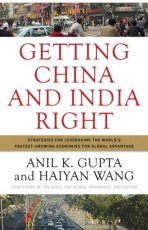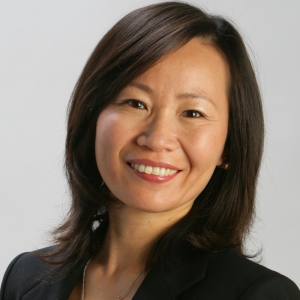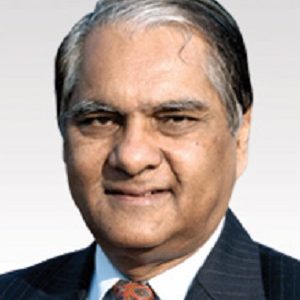Haiyan Wang Speaker Biography
International Expert on China and India
Haiyan Wang is managing partner of China India Institute, a research and advisory organization with a focus on the transformational rise of emerging markets, foremost China and India, and implications for key stakeholders.
Honors and Awards
Noted the world over for her vast expertise, she ranked at #25 by Thinkers50 as one of “the world’s most influential management thinkers.” Earlier, she was listed by Thinkers50 in “On the Guru Radar” and short-listed for the “2013 Global Solutions Award” and “2011 Global Village Award.” She has also been named a “New Guru” by The Economic Times.
Books
Haiyan writes frequently for Harvard Business Review and has also been a columnist for Bloomberg Businessweek. She is the co-author of three highly acclaimed books: The Silk Road Rediscovered, Getting China and India Right (which received the 2009 Axiom Book Awards’ Silver Prize as one of the world’s two best books on globalization/international business) and The Quest for Global Dominance (2nd Edition).
Publications
Her opinion pieces have appeared in top international media such as The Wall Street Journal, BusinessWeek, Financial Times, Chief Executive, Wired, The Economic Times, China Daily, The Times of India, South China Morning Post, as well as other outlets. She has been frequently interviewed by CNBC, The Wall Street Journal, Fox Business, India Today, CCTV, CNN Expansión, INSEAD Knowledge, and other prominent business media. She has also been an Adjunct Professor of Strategy at INSEAD.
Speaker
A native of China and a coveted speaker, Haiyan speaks at major conferences such as the Summer Davos, TEDx, Economist, CNN Expansión, Brookings Institution, Asia Society, Global Peter Drucker Forum events as well as corporate forums in the United States, Europe, Asia, and Latin America.
China
Prior to the founding of China India Institute in 2007, Haiyan spent over 20 years consulting for and managing multinational business operations in China and the United States across several different industry sectors. Wang was among the first batch of Chinese to study international business shortly after China embarked on economic reforms and opened its doors to the outside world. In the mid-1980s, she published several papers on China’s foreign trade reform in Chinese journals such as International Business and International Trade Tribune. Drawing on her broad international experience, she helps clients dissect global trends and make sense of the complex global landscape. In a global market that is increasingly Asia-focused and Asia-impacted, Wang’s expertise and insight on strategic direction in the East is undeniably valuable.
Haiyan Wang Speaking Topics
China 2030: What Lies Ahead
China is changing rapidly on all fronts – internally, its role on the global stage, as well as in terms of its relations with the leading Western powers. While economic growth will be slower than in the past, the average Chinese will be significantly richer, and China will be on the verge of joining the ranks of high-income countries. The population will be older, creating both challenges (rising social security and health care costs) as well as opportunities (rapid deployment of new technologies such as telehealth for the elderly and automation in factories). China will be greener, given the government’s enormous push towards both energy conservation as well as new forms of energy. China will also be technologically much more powerful, especially in fields such as artificial intelligence, telecommunications, and aerospace. At the same time, China will also need to navigate growing tensions with many of the leading Western powers, especially the United States. In this talk, Haiyan Wang will present her analysis of China’s evolution over the coming decade and its implications for multinational companies and investors.
China and the West: Competition or Cooperation
2020 will likely go down as an inflection point in China’s relations with the rest of the world, especially major economies such as the U.S., Canada, Japan, the U.K., France, India, and Australia. Internally too, China is changing as indicated by President Xi’s recently announced “domestic circulation” strategy suggesting an accelerated shift towards greater reliance on the domestic economy. With President Biden largely echoing Mr. Trump’s view of China as a competitor, adversary, and partner all at the same time, what will be the likely trajectory of the US-China relations over the next four years and in the long term? Facing a colder (more hostile) world, how might China chart its path in the 14th Five-Year Plan period covering 2021-2025? Haiyan Wang will share her analysis of the new geo-economic developments and their likely implications for multinational companies and investors.
Global Game Changers: Mega-Trends Reshaping the Global Economy
In the early 1990s, China was a relatively small economy which had just built its very first highway. Mobile phones were a luxury purchased mainly by rich Europeans. And, social media meant walking over to your neighbor to borrow his/her newspaper. How the world has changed over the last 25 years. Look ahead to 2030. Notwithstanding how much change we have witnessed in recent years, it’s a certainty that the quantum of change this decade will be even greater than over the last twenty-five. In this talk, Haiyan Wang will discuss the six megatrends that will drive this transformation: • Restructuring of the global economy • Digitization of everything • Growing geo-political risks • Climate crisis • Growing inequality, and • Transformation of jobs and work. Haiyan will also discuss what these megatrends mean for countries, companies, investors and individuals in terms of who can expect to thrive in the new era.
The Future of Globalization – Connected by Bits, Not Atoms
The echo chamber of analysts and observers, including some from the world’s leading media, is reverberating with cries about the end of globalization. This is akin to a hypothetical observer in 2000 looking at declining sales of camera films and lamenting about the supposed end of photography. People need to go back to first principles. Globalization refers to connectedness among nations – be it via trade in physical goods, trade in services, flows of capital, or flows of data. What’s happening today, indeed has been going on for the last 30 years, is the phasing out of the old globalization which rested primarily on trade in physical goods. Haiyan Wang argues that today’s era is defined by the rapid rise of ‘digital’ globalization which is far more powerful and is already contributing more to global GDP than the old globalization. She also discusses the implications of digital globalization for companies and investors.
Asia’s Next Chapter: Implications for Multinationals
Asia’s move to the world’s center will be one of the defining game changers for the global economy in the 21st century. Asia today accounts for about 35 percent of the world’s GDP as compared with less than a quarter each for the U.S. and Europe. Since Asia continues to grow faster than the other two continents, by 2030, Asia’s GDP will be as large as that of the US and Europe combined. Asia’s impact on the global economy is multidimensional. It is not just a mega-market, it is also a rising hub for global R&D, as a source of capital, and as the springboard for the rise of new global champions. This talk will examine the forces propelling Asia’s rise and discuss a number of related questions including: • What are the risks? What could derail Asia’s rise? • What are the implications of China’s slowdown for corporations and investors? • What lies ahead for India and Indonesia, the two largest Asian emerging economies after China? • How should MNCs prepare themselves to benefit from Asia’s rise? • Implications for investors? And, for young managers?
Getting China and India Right
Based on solid data and rich examples, Wang illustrates that China and India are the only two countries in the world that simultaneously constitute four game-changing realities: mega-markets for almost every product and service, platforms to dramatically reduce a company’s global cost structure, platforms to significantly boost a company’s global technology and innovation base, and springboards for the emergence of new fearsome global competitors. This talk outlines how companies can leverage the market and the resource opportunities presented by the China and India phenomenon to achieve global dominance within their particular industries.
Haiyan Wang Books
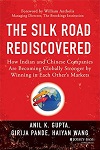
The Silk Road Rediscovered: How Indian and Chinese Companies Are Becoming Globally Stronger by Winning in Each Other’s Markets
Purchase Book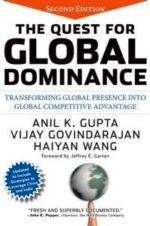
The Quest for Global Dominance: Transforming Global Presence into Global Competitive Advantage
Purchase Book